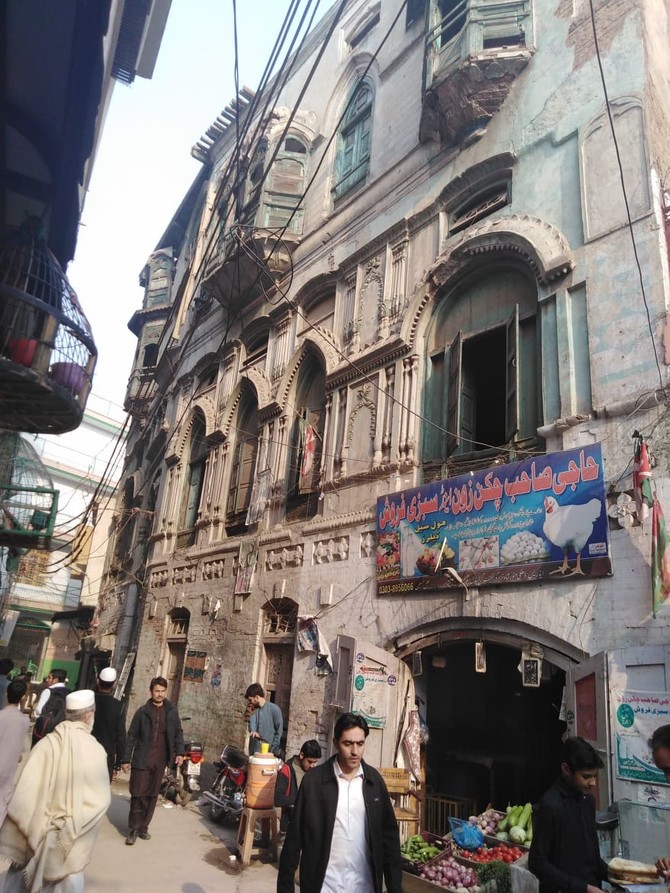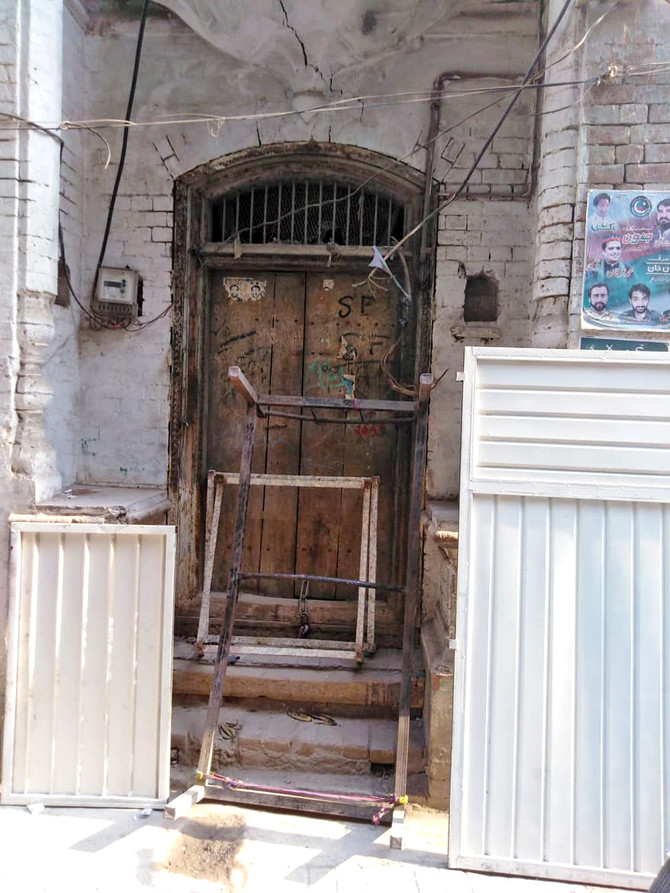PESHAWAR: From the old Qissa Khwani Bazaar in Peshawar, a narrow alleyway leads you to Dhakki Munawar Shah where a magnificent multi-story building stands tall and can be seen from a distance.
Locals know it as the birthplace of Prithviraj Kapoor, Shashi Kapoor, and Shammi Kapoor — legends of the Hindi film industry who were born and lived in Peshawar, before moving permanently to India.
The haveli or mansion has stood the test of time and is nearly a century old. It houses 40 rooms and is nestled in the heart of the walled city of Peshawar, one of its most distinctive landmarks, drawing locals and tourists alike in droves.
It was in the news once again when, recently, Foreign Minister Shah Mehmood Qureshi said that his government had received a call from Indian actor Rishi Kapoor to turn his ancestral home into an educational institution or a museum. Responding to media questions at the ground-breaking ceremony for the Kartarpur Corridor, Qureshi said: “You can tell him (Rishi Kapoor) that we’re entertaining his request.”
That’s something that locals in the area are campaigning for, too.
“Every day foreign tourists visit Raj Kapoor’s ancestral house and we want the historical Haveli to be turned into a museum which could help local business flourish,” Amir Nawaz, an octogenarian goldsmith who resides in the congested Dhakki Munawar Shah area, next to Qissa Khwani Bazaar, said.
Nawaz recalled a time when he was told by his father that the building’s splendid façade, with decorated jharokas, had been built between 1916-1918 by Raj Kapoor’s grandfather, Dewan Basheswarnath Singh Kapoor. “I still recall that Raj Kapoor, the father of Rishi Kapoor, was born in this building,” he said.
Mubarak Shah, another local who owns a roadside eatery stall in the area, said that the businesses in the vicinity had gained momentum following media reports about the haveli. “I prefer that the facility is turned into a tourist destination instead of an education center because this will multiply businesses,” Shah said, adding that the mansion is losing its efficacy due to carelessness. “A number of people ask me about its history on a daily basis. Being the birthplace of the legends of Indian cinema, the place is very famous,” he said.
During former dictator General Zia-ul-Haq’s rule in the late 1980s, Nawaz said that Raj Kapoor’s younger brother, Shashi Kapoor, and Rishi had visited Peshawar, taking with them some soil from their ancestral home which was used during the construction of the Raj Kapoor in India.
The sons of late Hajji Khushhal, the owner of the compound, had demolished its top two floors a few years ago citing that the place was in shambles. However, it was only after the intervention of the archaeology department that further demolition was put on hold.
Nawaz-Ud-Deen, a research officer at the archaeology department in Peshawar, told Arab News that the haveli is a private property owned by Israr Khan, a jeweler. “Basically, it was a five-story building but its owners have demolished two of its floors. However, our department swung into action and stopped him from further damaging the place,” he said.
One look at the haveli and one can understand why. The ancient facility’s grandeur is intact with its majestic design adorned with exquisite flowers and complimented with swinging balconies. The façade is built with old bricks and a variety of arches and represents the perfect blend of Hindu architecture with structural artwork from the Mughal era. “We want to preserve this historic building but let’s first reach a settlement with its owner to acquire it as a government property,” Nawaz-Ud-Deen said.
He added that his department is waiting for approvals from the central or provincial governments before initiating the “gigantic project” to turn it into a public facility.
Locals urge authorities to turn Raj Kapoor’s ancestral home into a museum
Locals urge authorities to turn Raj Kapoor’s ancestral home into a museum

- Insist it will help their businesses flourish as the landmark is a famous attraction in Peshawar
- Multi-story villa was built between 1916-1918
Pakistani naval ships visit Kuwait and Iraq, conduct joint exercises in Arabian Gulf

- Pakistan regularly holds joint exercises with allies to increase synergy and deter piracy, drug trafficking and other illicit activities
- The visit of Pakistan Navy flotilla to Kuwait and Iraq will further enhance the existing diplomatic and naval relations, the military says
ISLAMABAD: Pakistani naval ships have visited Kuwaiti and Iraqi ports to conduct joint exercises with both navies in the Arabian Gulf, the Pakistani military said on Sunday, adding the visits would enhance existing relations.
Pakistan Navy Ships (PNS) Rasadgar and Azmat visited the Kuwaiti port of Al-Shuwaikh, while Pakistan Maritime Security Agency (PMSA) ship Dasht visited the Iraqi port of Umm Qasr, according to the Inter-Services Public Relations (ISPR), the Pakistani military’s media wing.
On arrival at both ports, Pakistani diplomatic and host naval officials warmly welcomed the Pakistan Navy ships and the mission commander, along with commanding officers of the ships, held meetings with the naval leadership of both countries.
“Later, naval exercises were also conducted together with Kuwaiti and Iraqi navy ships,” the ISPR said in a statement. “The exercises were aimed at improving mutual cooperation between the navies and developing the capacity for joint operations.”
During the meetings, naval officials discussed matters of mutual interest, cooperation in maritime security and communication, according to the statement.
“The visit of Pakistan Navy flotilla to Kuwait and Iraq will further enhance the existing diplomatic and naval relations with friendly countries,” it read.
Pakistan Navy regularly collaborates and holds joint military exercises with allies to increase synergy, promote regional peace and stability and deter piracy, drug trafficking and other illicit maritime activities.
This month, Pakistan Navy conducted joint naval exercises and drills with Royal Oman ship ‘Alseeb.’ The bilateral naval exercise, “Samar Al-Tayeb,” is conducted regularly between the navies of the two nations.
In July, Pakistan Navy also assumed command of a multinational task force responsible for ensuring maritime security in the southeastern waters of the Middle East, operating in the Arabian Sea, Gulf of Oman and Gulf of Aden.
Pakistan’s army vows to hunt down militants a day after attack kills 16 soldiers

- Pakistan has struggled to contain militancy in its northwest since a fragile truce with Pakistani Taliban broke down in 2022
- Islamabad has frequently blamed the surge in militancy on militants operating out of Afghanistan, Kabul denies the allegation
ISLAMABAD: Pakistan’s army chief, General Asim Munir, on Sunday vowed to hunt down militants waging attacks against security forces and their facilitators, the Pakistani military said, a day after the killing of 16 soldiers in an ambush in the country’s northwest.
Gen. Munir said this during his visit to the South Waziristan district in Pakistan’s northwestern Khyber Pakhtunkhwa (KP) province, which has been battling a surge in militancy.
The visit came a day after the killing of 16 soldiers and eight militants during a gunfight in South Waziristan after a group of militants ambushed an army outpost in Makeen area.
Interacting with officers and troops, the army chief commended their resilience and steadfastness in the face of militancy, according to the Inter-Services Public Relations (ISPR), the military’s media wing.
“The army chief highlighted that the courage, resilience, and unyielding determination of Pakistan’s armed forces are the cornerstone of the nation’s sovereignty,” the ISPR said in a statement
“COAS reaffirmed Pakistan Army’s commitment to pursuing Fitna Al Khwarij [militants] which shall continue to be hunted down till its elimination along with the facilitator, abettors and financier who will be made to pay the price for their nefarious activities against the state.”
The brazen raid on the outpost near the border with Afghanistan was claimed by the Pakistani Taliban, who said it was staged “in retaliation for the martyrdom of our senior commanders.”
The development came days after the Pakistani military said it had killed 11 militants in separate operations in KP’s Tank, North Waziristan and Mohmand districts.
Pakistan has witnessed a surge in militancy in KP since November 2022, when a fragile truce between the Pakistani Taliban and the government in Islamabad broke down.
Islamabad has frequently accused neighboring Afghanistan of sheltering and supporting militant groups that launch cross-border attacks. Afghan officials deny involvement, insisting Pakistan’s security issues are an internal matter of Islamabad.
On Saturday, the Pakistani military also urged the Taliban administration in Kabul to ensure robust border management after a group of militants tried to infiltrate from Afghanistan, leading to a skirmish that left four militants and a soldier dead a day earlier.
Pakistan national airline aims to expand its fleet to improve flight operations

- PIA has 23% of Pakistan’s domestic aviation market, but its 34-plane fleet has failed to compete globally
- The airline has faced a lack of direct flights, despite having agreements with 87 countries and key landing slots
KARACHI: Pakistan International Airlines (PIA) is aiming to expand its fleet to improve flight operations, the national flag carrier said on Sunday, following the addition of another Airbus 320.
PIA has 23 percent of Pakistan’s domestic aviation market, but its 34-plane fleet has failed to compete with carriers internationally.
The Pakistani airline has been facing a lack of direct flights, despite having agreements with 87 countries and key landing slots.
“The 11th Airbus 320 AP-BOM has been inducted into the operational fleet with new engines. The aircraft was rolled out from the hangar with new paint and cabin decoration,” PIA said in a statement.
“PIA’s operational fleet will also include long-grounded Boeing 777 and ATR aircraft in the next few days.”
The fleet revival will greatly improve the expansion of PIA’s network and product quality, according to the statement. From this week, PIA has also introduced an in-flight Internet system in domestic flights, which is gaining popularity among passengers.
The airline said strict adherence to flight schedules, providing safe and high-quality products to passengers was its top priority.
“PIA’s flight schedule has achieved 90 percent regularity,” PIA Chief Executive Officer Khurram Mushtaq said. “Measures for operational fleet expansion and product improvement are part of our commitment.”
Earlier this month, PIA said it would resume flights to Europe in January, starting with Paris, after the EU aviation regulator lifted a ban on the national flag carrier.
PIA’s authorization to operate in the EU was suspended in June 2020 over concerns about the ability of Pakistani authorities and its Civil Aviation Authority to ensure compliance with international aviation standards.
The ban cost the loss-making airline 40 billion rupees ($144 million) annually in revenue. Pakistan’s attempts to privatize PIA fell flat this year, when it received only a single offer, well below its asking price.
Pakistani province launches helicopter service to evacuate people, dispatch aid to clashes-hit district

- Clashes between Sunni, Shia tribes have killed over 100 people in Kurram since last month
- On Friday, authorities set a deadline of Feb. 1 for the warring tribes to surrender weapons
PESHAWAR: Pakistan’s northwestern Khyber Pakhtunkhwa (KP) province has launched a helicopter service to evacuate people and transport aid to Kurram district that has been hit by sectarian clashes in recent weeks, officials said on Sunday.
Kurram, a tribal district of around 600,000 near Pakistan’s border with Afghanistan where federal and provincial authorities have traditionally exerted limited control, has been a flashpoint for sectarian tensions between Shia and Sunni tribes for decades.
Fresh clashes that erupted last month have killed more than a hundred people, triggering a humanitarian crisis with reports of starvation, lack of medicine and oxygen shortages following the blocking of the main highway connecting Kurram’s main city of Parachinar to the provincial capital of Peshawar.
In response to the problems being faced by residents, the KP administration has been facilitating travel between Parachinar and Peshawar. On Sunday, two flights evacuated 27 individuals as well as carried 16 government staffers and members of a tribal council, which has been striving to achieve peace, to Kurram.
“There is no fare involved in transportation of people or medicines via the helicopter, rather it is a voluntary service by the KP government to meet the emergency situation,” Nisar Muhammad Khan, a KP government official, told Arab News.
The helicopter service was also being used to dispatch medicines to Parachinar. A day ago, 53 individuals, including 14 patients, were shifted to Peshawar from Kurram via helicopter, according to the provincial authorities.
A third flight was scheduled to bring people stranded in the Tal area back to Parachinar, while five more flights were expected to relocate over a hundred people on Sunday, according to the provincial government.
Chief Minister Ali Amin Gandapur’s office said the government had so far dispatched 1,850 kilograms of medical supplies to Kurram, assuring that it would mobilize all resources to ease problems of the people and ensure durable peace in the region.
The development comes days after the KP authorities set a deadline of Feb. 1 for warring Sunni and Shia tribes in the district to surrender all weapons and dismantle their bunkers to stem sectarian clashes in the region.
The decision was made at a meeting of the KP apex committee, which comprises civilian and military officials, to discuss a sustainable solution to the issue. It allowed the launch of a special air service for temporary evacuation from some parts of Kurram to protect people’s lives, according to the apex committee declaration.
“The agreement outlines that both sides will submit a detailed action plan within 15 days for voluntary submission of weapons,” read a declaration issued after the apex committee meeting.
“All weapons are to be deposited with the local administration by February 1. Additionally, it was decided that all bunkers in the area will be dismantled by the same deadline.”
In the meantime, land routes to the area would be opened intermittently on humanitarian grounds and a mechanism was put in place for secure transportation, according to the statement.
“Personnel of police and Frontier Corps will jointly provide security to the convoys,” it read.
Last month’s clashes erupted after rival tribes attacked convoys of passengers on the Parachinar-Peshawar road, which were followed by attacks on each other’s villages.
The apex committee asked both sides to avoid any violent action in the future to keep the land route safe and open at all times, hoping that the parties would fully cooperate with the government for a lasting solution to the issue.
Champions Trophy preparations in full swing as Karachi stadium upgradation nears completion

- PCB Chairman Mohsin Naqvi says the National Stadium will be ready well before the ICC tournament
- He says the PCB is improving facilities for Pakistani cricket fans to ensure they have a better experience
ISLAMABAD: Preparations for the ICC Champions Trophy 2025 are progressing rapidly, with the upgradation of Karachi’s National Stadium nearing completion, Pakistan Cricket Board (PCB) Chairman Mohsin Naqvi said on Sunday during a visit to the venue.
The tournament, scheduled for February 2025, has been at the center of controversy following India's reluctance to play in Pakistan due to strained political ties.
The International Cricket Council resolved the impasse by approving a hybrid model, allowing India’s matches to be held at neutral venues while other teams play in Pakistan. The decision ensured India’s participation while retaining Pakistan as the official host.
“Remarkable progress has been made in a very short time,” Naqvi was quoted in a PCB statement. “The upgradation of the National Stadium will be completed well before the Champions Trophy tournament.”
During the visit, Naqvi reviewed ongoing projects, including the installation of new seats in enclosures, enhanced parking facilities for 2,700 vehicles and finishing work on the stadium building.
He also instructed officials to expedite the installation of LED lights and scoreboards.
“We are improving facilities for cricket fans to ensure they have a better experience,” he added.
The PCB is under pressure to ensure the country is ready to host the major ICC tournament.
Security concerns and political tensions had previously kept high-profile international cricket events away, but recent improvements in safety and infrastructure have bolstered Pakistan’s case as a venue.
Praising the rapid progress at the National Stadium, Naqvi lauded the project team for their dedication.
“I congratulate the entire team for their outstanding and swift work,” he said.
The Champions Trophy is seen as a pivotal moment for Pakistan cricket, with the PCB aiming to deliver a world-class tournament to reaffirm the country’s ability to host international events successfully.














